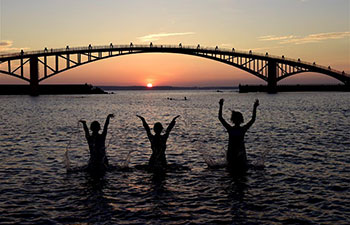BERLIN, 30 Aug. (Xinhua) -- Two days before the federal state elections in Saxony and Brandenburg, the Minister-President of Saxony, Michael Kretschmer underlined his clear demarcation from the AfD in an interview with German newspaper ZDF on Friday.
Kretschmer emphasized that "the AfD must not be given any responsibility" in Saxony as it "was slipping further and further into right-wing extremism".
Saxony's Minister-President Kretschmer had repeatedly ruled out cooperation with the right-wing Alternative for Germany (AfD) in the past months.
Kretschmer accused the AfD of "mobilizing in a very bad way in the last 48 hours" on the internet and called on voters to go to the polls to "prevent this small minority becoming too strong".
Brandenburg's Minister-President, Dietmar Woidke, similarly took a stance against the AfD, warning that it would deter investors if the right-wing populist party became the strongest force on Sunday.
"The AfD is lying, it is stirring up fear and hatred," Minister-President Woidke told the German newspaper Tagesspiegel.
According to the latest Politbarometer published by German broadcaster ZDF on Thursday night local time, the two governing parties would remain the strongest forces in their respective states.
According to the Politbarometer survey, the CDU in Saxony had extended its lead over the AfD and would be the strongest political party with 32 percent of the vote.
The right-wing AfD, meanwhile, would gain 25 percent of the votes if the elections were held Saturday, followed by the Left Party at 14 percent and the Greens at 11 percent.
The German Social Democrats (SPD) would only gain 8.5 percent of voter support, based on the Politbarometer survey.
In contrast, if the elections in Brandenburg were held Saturday, the social democrats would gain 22 percent of the vote and be the strongest political force, the survey found.
However, the German social democrats would still be competing with the right-wing AfD, which would gain 21 percent of votes, according to the Politbarometer.
"The better the results for the AfD, the more difficult it will be to form stable state governments in Saxony and Brandenburg," Robert Vehrkamp, senior advisor & democracy expert at the Bertelsmann Foundation, told Xinhua.
The latest ZDF political barometer also showed that both Minister Presidents in Saxony and Brandenburg were supported by their respective populations.
Minister-President, CDU politician Kretschmer "has a very clear lead" over the AfD's top candidate Joerg Urban on the question of desired head of state, with 67 percent to 9 percent, according to the Politbarometer.
Kretschmer would also be chosen above the Left Party's candidate Rico Gebhardt with 62 percent to 9 percent, the survey found.
Saxony's AfD leader Urban told the German newspaper ZDF that his party wanted to govern, "to become the strongest force" and not only to participate in government.
Voters in Brandenburg would want the current Minister-President Dietmar Woidke to continue as the head of government, according to the Politbarometer.
The SPD Minister-President had an approval rating of 58 percent, compared to 10 percent for the AfD's top candidate in Brandenburg, Andreas Kalbitz.
In comparison with the CDU's top candidate, Ingo Senftleben, Woidke was ahead with 51 percent compared to 20 percent, according to the Politbarometer survey.
In Brandenburg, however, the CDU ranked behind both the SPD and AfD at 16.5 percent of voter support, according to the Politbarometer.
The Green Party in Brandenburg would gain 14.5 percent of voter support if the elections were held tomorrow, while the Left Party would gain 14 percent, the Politbarometer showed.
CDU candidate Senftleben stressed that "we are not talking to the AfD about a government in Brandenburg. This is a clear statement: we will not make a government with the AfD after the state elections".
However, Senftleben noted that he would "talk to the right-wing" after the German federal state elections "out of respect" for their voters.
At the same time, Bertelsmann Foundation expert Vehrkamp told Xinhua that the AfD "remains on the sidelines with results of more than 20 percent, and is rejected by a very large majority of people in East Germany".
"For despite all the justified fixation on the rising election results of the AfD, this should not be overlooked as also, in east Germany, no other party is rejected as strongly and categorically as the AfD by an overwhelming majority of voters," stated Vehrkamp. Enditem













